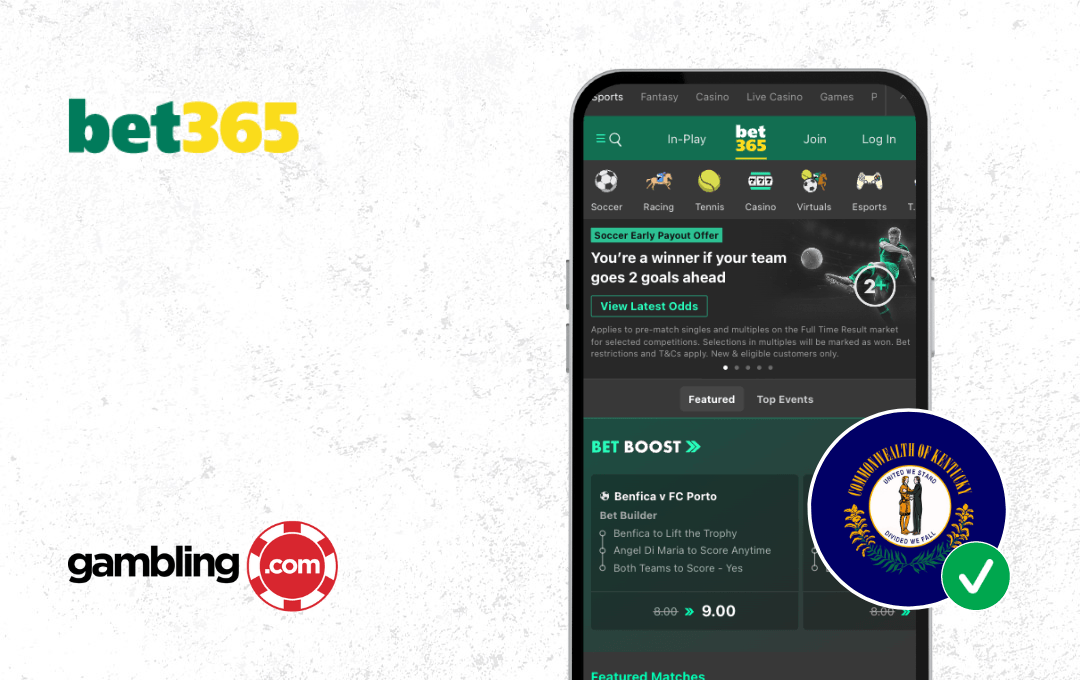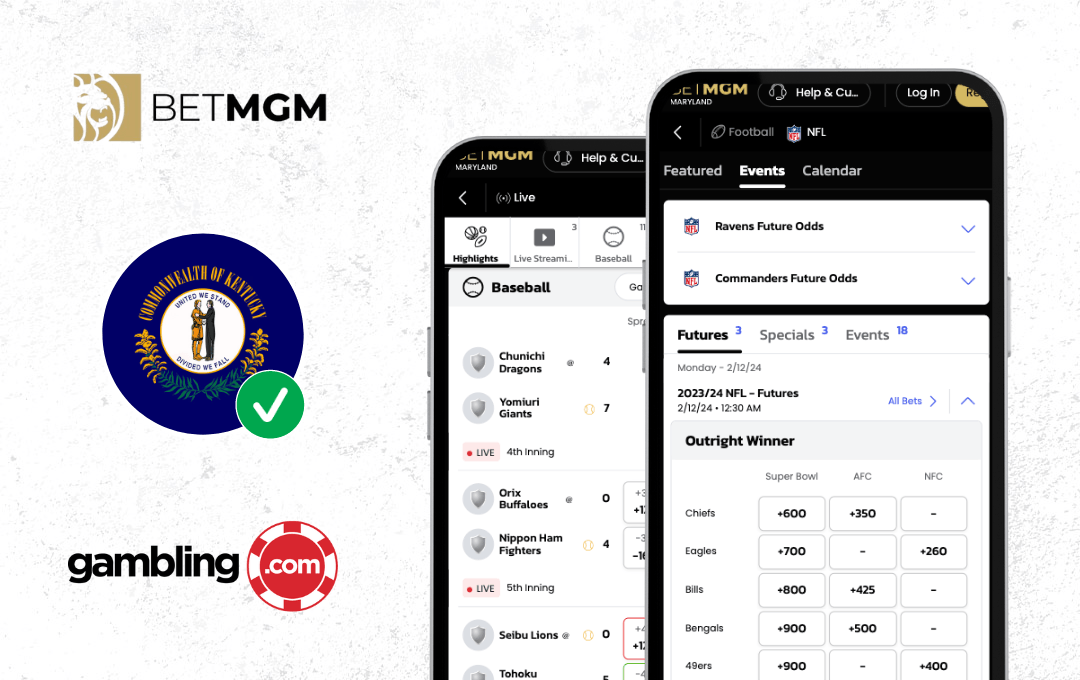Best Kentucky Sportsbooks, Sports Betting Apps & Promos (2026)
Sports betting is legal and live in Kentucky.
We have thoroughly tested, reviewed, and ranked the top Kentucky sportsbooks and sports betting apps. Use our expert guide to claim the best Kentucky sportsbook promos.
Best Kentucky Sportsbook Promos
- Must be 21+ to participate (18+ in KY). Gambling problem? Call 1-800-GAMBLER (CO, IL, IA, KY, KS, LA, MD, MO, NC, NJ, OH, PA, TN, VA). Call 1-800-NEXT-STEP (AZ). Call 1-800-9-WITH-IT (IN). CALL 1-877-770-STOP (LA). Must be present in LA (select parishes). Licensee partner Amelia Belle Casino. Minimum $10 deposit required. Minimum odds -500 or greater. Bonus Bets wager excluded from returns. New customers only. T&Cs, time limits and exclusions apply.
- Gambling problem? Call 1-800-GAMBLER (Available in the US) Call 877-8-HOPENY or text HOPENY (467369) (NY) Call 1-800-327-5050 (MA), 1-800-NEXT-STEP (AZ), 1-800-BETS-OFF (IA), 1-800-981-0023 (PR) 21+ only. Please Gamble Responsibly. See http://BetMGM.com for Terms. First Bet Offer for new customers only (if applicable). Subject to eligibility requirements. Bonus bets are non-withdrawable. In partnership with Kansas Crossing Casino and Hotel. This promotional offer is not available in DC, Mississippi, New York, Nevada, Ontario, or Puerto Rico.
- 21+. New customers in AZ, CO, CT, DC, IA, IL, IN, KS, KY, LA, MA, MD, MI, MO, NC, NJ, OH, PA, TN, VA, VT, WV, or WY (excludes NY). Apply promotion in bet slip and place a $1+ cash wager (min odds -200) daily for 10 consecutive days starting day of account creation. FanCash rewards will equal the qualifying wager amount (max $100 FanCash/day). FanCash issued under this promotion expires at 11:59 p.m. ET 7 days from issuance. Terms, incl. FanCash terms, apply—see Fanatics Sportsbook app. Gambling Problem? Call or Text 1-800-GAMBLER, 1-800-NEXT-STEP (AZ), 1-800-9-WITH-IT (IN), 1-888-532-3500 (VA).
- Must be 21+ and physically present in AZ, CO, IL, IN, IA, KS, KY, LA, ME, MD, MA, MI, MO, NJ, NY, NC, OH, PA, TN, VA, WV, WY or Washington, DC. New users only. Must register using eligible promo code. First wager after registration must qualify. Min. Odds: -500. Max. Bonus Bet: $250. Awarded as non-withdrawable Bonus Bet that expires 14 days after receipt. Bonus Bet amount not returned for winning bets. Void where prohibited. See http://Caesars.com/promos for full terms. Know When To Stop Before You Start®. Gambling Problem? CO, IL, KY, MD, MI, MO, NJ, OH, TN, VA, WV, WY, KS (Affiliated with Kansas Crossing Casino), ME (Licensed through the Mi’kmaq Nation, Penobscot Nation, and Houlton Band of Maliseet Indians, federally recognized tribes located in the State of Maine), NC (Licensed through Tribal Casino Gaming Enterprise), PA (Affiliated with Harrah's Philadelphia): If you or someone you know has a gambling problem, crisis counseling and referral services can be accessed by calling 1-800-GAMBLER (1-800-426-2537) or MD: visit http://mdgamblinghelp.org or WV: visit http://1800gambler.net ; AZ: Call 1-800-NEXT-STEP; IN: Call 1-800-9-WITH-IT; IA: Call 1-800-BETSOFF; LA (Licensed through Horseshoe Bossier City and Caesars New Orleans), Washington, DC (OLG Class A licensed Operator): Call 1-800-522-4700. ©2025, Caesars Entertainment Gambling Problem? Call 1-800-GAMBLER DC, LA: Call 1-800-522-4700 MA: Call 1-800-327-5050 or visit http://gamblinghelplinema.org NY: Call 877-8-HOPENY or text HOPENY (467369)
- Must be 21+ to participate. T&Cs Apply. Play Responsibly. Gambling problem? Call 1-800-GAMBLER (CO, DC, IL, KY, LA, MD, MO, MS, NJ, OH, PA, VA, WV, WY), Call 1-800-9-WITH-IT (IN), Call 877-8-HOPENY or text HOPENY (467369) (NY). Call 1-800-NEXT-STEP (AZ), 1-800-522-4700 (KS), 1-800-327-5050 (MA), 1-800-BETS-OFF (IA), 1-800-270-7117 for confidential help (MI), Call 877-718-5543 or visit morethanagame.nc.gov. (NC), Call or Text 800-889-9789 (TN).
- Must be 21+ to participate. T&Cs Apply. Play Responsibly. Gambling problem? Call 1-800-GAMBLER (CO, DC, IL, KY, LA, MD, MS, NJ, OH, PA, VA, WV, WY), Call 1-800-9-WITH-IT (IN), Call 877-8-HOPENY or text HOPENY (467369) (NY). Call 1-800-NEXT-STEP (AZ), 1-800-522-4700 (KS), 1-800-327-5050 (MA), 1-800-BETS-OFF (IA), 1-800-270-7117 for confidential help (MI), Call 877-718-5543 or visit morethanagame.nc.gov. (NC), Call or Text 800-889-9789 (TN).
- GAMBLING PROBLEM? CALL 1-800-GAMBLER or 1-800-522-4700, (800) 327-5050 or visit http://gamblinghelplinema.org (MA). Call 877-8-HOPENY/text HOPENY (467369) (NY). Please Gamble Responsibly. 888-789-7777/visit http://ccpg.org (CT), or visit www.mdgamblinghelp.org (MD). 21+ and present in most states. (18+ DC/KY/NH/WY). Void in ONT/OR/NH. Eligibility restrictions apply. On behalf of Boot Hill Casino & Resort (KS). Pass-thru of per wager tax may apply in IL. 1 per new customer. Must register new account to receive reward Token. Must select Token BEFORE placing min. $5 bet to receive $200 in Bonus Bets if your bet wins. Min. -500 odds req. Token and Bonus Bets are single-use and non-withdrawable. Bet must settle by and Token expires 3/15/26. Bonus Bets expire in 7 days (168 hours). Stake removed from payout. Terms: http://sportsbook.draftkings.com/promos . Ends 3/8/26 at 11:59 PM ET. Sponsored by DK.
Why You Can Trust Gambling.com-Verified KY Sportsbook Promos
Top KY sportsbook promos provide excellent welcome bonuses and ongoing deals, including frequent bonus bets to enhance your winning potential. These sportsbooks offer appealing bonuses to attract users and provide a diverse betting market covering numerous sports and bet types.
In our assessment of Kentucky betting promos, we evaluate and recommend licensed and regulated sites by the Kentucky Horse Racing & Gaming Corporation, ensuring access to only the best, lawful sportsbooks.
"We verify that each promotion listed comes with a variety of payment options and outstanding customer support, and ensures a superior betting experience in Kentucky."
Comparing Our Experts' Top Kentucky Sportsbooks
| KY Sportsbook | Our Overall Rating |
|---|---|
| 1. FanDuel | 9.1/10 |
| 2. DraftKings | 8.9/10 |
| 3. bet365 | 8.9/10 |
| 4. BetMGM | 8.6/10 |
| 5. Fanatics Sportsbook | 8.15/10 |
| 6. Caesars Sportsbook | 7.1/10 |
Why You Can Trust Gambling.com's KY Sportsbook Reviews
Kentucky's legal sports betting platforms leave you with a good choice of where to place your online bets. We help you stay informed and understand the key features of each platform, so you can make the most of your betting experience.
Whether you're a seasoned bettor or a beginner, we recommend a Kentucky sports betting app that is right for you.

| Launch Date | Sept. 28, 2023 |
| Platforms | iOS, Android, desktop |
| Licensing Partner | Turfway Park Racing & Gaming (Churchill Downs) |
| Retail Location | None |
| Mobile Live Streaming | Yes |
| Loyalty Program | None |
FanDuel's user experience is excellent, featuring an intuitive app, straightforward navigation, extensive betting markets, competitive odds, and a regular rotation of promotions that cater to both newcomers and seasoned bettors.
Some of our favorite FanDuel Kentucky features center on live betting, including its live streaming and early cashouts.
The FanDuel app is easy to use and versatile, offering a wide range of betting options. Unlike many Kentucky apps and sites that simplify for smaller screens, FanDuel retains multiple navigation options. This can make the screen busy, but it also provides easy access to handy features. That's why we recommend using the site for a more extensive range of betting markets.

Pros & Cons
- More online banking options than most KY sportsbooks
- Extensive, high-quality live betting & streaming
- First-to-market odds that remain competitive
- Consistent promos, including early payouts & referral bonus
- Thousands of betting markets, including international sports
- Smooth user experience across desktop & mobile platforms
- Easy-to-use beginner guides
- No loyalty rewards program for sports betting
- Prop bets selection could be improved
- Layout can sometimes feel cluttered
What KY App Users are Saying
- "I use FanDuel mostly for betting. The software and layout is great and they give you real time stats, which I find useful. "
- "I chose FanDuel because they seemed more professional than other companies but clearly haven't smoothed their App bugs out."
| Launch Date | Sept. 28, 2023 |
| Platforms | iOS, Android, desktop |
| Licensing Partner | Cumberland Run & The Mint Gaming Hall Cumberland |
| Retail Location | The Mint Cumberland; the Mint Cumberland Run; the Mint Bowling Green |
| Mobile Live Streaming | Yes |
| Loyalty Program | Dynasty Rewards |
Known for its user-friendly design and variety of betting options, DraftKings ranks among the top Kentucky sports betting apps.
The app really does DraftKings Kentucky's features justice. The app features live betting options and HD live streaming, making it ideal for those who enjoy the thrill of making decisions on the fly. DraftKings' top features include free-to-play contests, same-game parlays, early cashouts, live streaming, and DK Social.
DraftKings Kentucky offers enticing odds for major domestic leagues. Players can find a new array of offers and bonuses daily, including odds boosts, profit boosts, and bet-and-get offers.

Pros & Cons
- Can watch live games & place bets simultaneously
- Comprehensive Dynasty Rewards program
- Offers a huge range of bet types & markets
- Fast, simple banking with cash out available
- New promo offers every day
- Fast, responsive app
- Customer support is often slow to respond
- No live streaming on site
What KY App Users are Saying
- "The profit boosts are nice and unlike anything I've ever seen on any other app or site. So that's a plus."
- "They show PayPal as an option, but it doesn't work because PayPal doesn't allow any transactions through any gambling sites."
| Launch Date | Sept. 28, 2023 |
| Platforms | iOS, Android, desktop |
| Licensing Partner | Sandy’s Racing & Gaming (Revolutionary Racing Kentucky) |
| Retail Location | None |
| Mobile Live Streaming | Yes |
| Loyalty Program | None |
bet365 boasts ultra-competitive live betting odds across a wide variety of sports and is consistently rated our best Kentucky sportsbook for odds value. You'll find an incredible range of betting markets, including extensive coverage of popular leagues and sports like soccer and tennis. Maybe bet365's most well-known feature, early cashouts are available year-round for every major sport.
The website and app are perhaps less intuitive and polished compared to our top two Kentucky sportsbooks. But you'll find that you can adapt quickly. What bet365 lacks in flair, it makes up for in substance.

Pros & Cons
- Early payout offers
- Great live betting offering, including extensive live streaming & live stats
- Market-leading odds especially for in-game betting
- Easy navigation
- Fast, reliable user experience
- More online banking & withdrawal options than many KY sportsbooks
- No loyalty rewards program
- Design feels more outdated compared to FanDuel & DraftKings
- Some users experience lags
What KY App Users are Saying
- "Bet365 and their team have created the best, unique, fastest and aesthetically pleasing legal sports betting application."
- "I had been trying to contact the customer service and found out that you don't have any."
| Launch Date | Sept. 28, 2023 |
| Platforms | iOS, Android, desktop |
| Licensing Partner | Sandy’s Racing & Gaming (Revolutionary Racing Kentucky) |
| Retail Location | Sandy's BetMGM Sportsbook |
| Mobile Live Streaming | Yes |
| Loyalty Program | MGM Rewards |
Known for its easy-to-use design, BetMGM is a top pick for new bettors in Kentucky.
The "King of Sportsbooks" is renowned for its intuitive user experience, competitive odds, and a wide range of betting options, particularly in parlays. BetMGM's Easy Parlay builder tool allows you to build same-game and multi-game parlays with just a few clicks from a single screen.
BetMGM's live betting and live streaming features are exciting. There's an extensive collection of betting markets, and you can often find live streams, even for smaller-scale leagues and sports.

Pros & Cons
- Operates a retail sportsbook in KY where you can make use of MGM Rewards
- Daily promotions, including regular odds boosts & referrals
- Wide range of betting markets
- Clean app layout & user interface
- Fast-loading odds & live streams
- Face ID & biometric log-in options available
- Platforms can be slow to load at times
- Potential for slower customer support response time vs. competitors
- Inconsistent withdrawal times
- Some gelocation issues reported
- App layout can feel cluttered at times
What KY App Users are Saying
- "Bonuses and promotions are good with clear rules and obvious expiration dates, and are easy to apply on a wager. Synchronization with the broader MGM rewards program is seamless and easy to track."
- "The verification process was painstaking and bizarre."
| Launch Date | Sept. 28, 2023 |
| Platforms | iOS, Android |
| Licensing Partner | Oak Grove Racing & Gaming |
| Retail Location | None |
| Mobile Live Streaming | Yes |
| Loyalty Program | FanCash Rewards |
Fanatics Sportsbook received its Kentucky license after acquiring PointsBet Sportsbook in several states. Fanatics sets itself apart with an overall enhanced user experience that tech-savvy bettors will love. It offers live betting functionality with real-time competitive odds and live-streaming services for events such as the NFL.
Fanatics Sportsbook delivers an excellent mobile-first betting experience with a sleek design, strong live betting, and one of the best rewards programs in the industry. However, as a newer platform, it still has room to grow, particularly in customer support, market depth, and desktop accessibility.
Pros & Cons
- Extensive range of bet types
- Innovative win-or-lose rewards program in FanCash
- Plenty of promotions, including odds boosts & referrals
- Easy-to-use navigation & design
- Good live betting & streaming features
- Consistent odds that provide good value
- No desktop betting site
- Customer support can be difficult to reach
- Betting markets aren't quite as expansive as other KY sportsbooks
What KY App Users are Saying
- "Fanatics are one of the leading sports betting apps with a lot of listings and doing right by [their] customers"
- "Nice layout and many options available. I'm a really big fan of the live events, especially the basketball and hockey. it's some of the best"
| Launch Date | Sept. 28, 2023 |
| Platforms | iOS, Android, desktop |
| Licensing Partner | Keeneland & Red Mile Gaming & Racing |
| Retail Location | Caesars Sportsbook at Red Mile Gaming & Racing |
| Mobile Live Streaming | Yes |
| Loyalty Program | Caesars Rewards |
Caesars offers a seamless overall user experience with a smooth and intuitive design. Caesars has an astonishing range of betting markets, especially for parlays and international sports. While live streaming can be limited outside of the NFL, you can still live bet easily, cash out bets early, and easily earn Caesars Rewards.
One of its standout features is the variety of promotions, including bonus bets, odds boosts, and welcome bonuses for new users. Overall, Caesars combines generous promotions, a strong brand, and diverse betting options, making it a promising choice in Kentucky.
Pros & Cons
- Operates a retail sportsbook in KY where you can use Caesars Rewards
- Competitive betting lines
- Weekly promotions, including odds boosts, referrals, profit boosts
- Smooth & intuitive website design
- NFL live streaming with Watch & Bet feature
- Plenty of betting options, including same game parlays
- Fast withdrawal with debit cards
- Easy access to quick picks
- Live stream accessibility can be challenging
- Customer service can be difficult to reach
- Daily boosted bets are often for very long odds
- Live score updates and odds tend to be slower vs. competitors
- Layout can sometimes make navigation challenging
What KY App Users are Saying
- "I do like this new app and the promos that come with it"
- "If this app would run more smooth without crashing and all the other little bugs it would be almost flawless."
More Great Kentucky Sportsbooks to Explore
| KY Sportsbook | Licensing Partner | Retail Location |
|---|---|---|
| Circa Sports | Cumberland Run & The Mint Gaming Hall Cumberland | None |
| Prime Sports | Churchill Downs Racetrack | None |
| theScore Bet | Ellis Park Racing & Gaming | None |
How We Rate Kentucky Sports Betting Sites & Apps
At Gambling.com, we rate the best Kentucky betting apps based on key factors for a top-notch betting experience. Our goal is to offer reliable ratings that help you make informed choices for the best Kentucky sports betting experience.
Selecting the best Kentucky sports betting apps can make your betting more enjoyable. We evaluate the speed of the Kentucky sports betting app to ensure quick, easy betting, which is crucial for features like same-game parlays.
Licensing & Security
All of our recommended Kentucky sportsbooks are appropriately licensed, as regulated sites are held to high standards of fairness and transparency.
- Legal sites are regulated by state authorities, ensuring that your personal and financial information is secure. In case of disputes, bettors have legal recourse.
- Legal online sports betting sites have a legal obligation to pay out winnings. Tax revenue from legal sports betting supports public services and infrastructure.
- Regulated sites offer tools for self-exclusion, deposit limits, and support for individuals with problem gambling issues.
Trust Factors
After we confirm their licensing, we give each sportsbook a grade between 1 and 10, averaging scores across several key trust factors, some of which include:
Sports & Markets
A wide range of bets and sports options gives you more flexibility in your betting strategy.
Promotions
Sports bettors can claim Kentucky sportsbook promos at virtually any point after opening an account. When reviewing sites, we claim the same offers and test them to ensure bettors are getting the best value for their money.
Payments
Kentucky's online sportsbooks provide multiple safe and easy banking methods. Options differ by sportsbook, with potential limits.
Customer Support
Reliable support through live chat, email, or phone is crucial for resolving issues quickly.
Reputation & User Feedback
User feedback is vital to us. We include ratings from a wide range of users who have tried the apps on different devices. This helps us get a complete view of each app's performance and user satisfaction.
Site UX
We assess the user experience, focusing on design and ease of use. An intuitive and responsive design is essential for a smooth betting experience on an online sportsbook.
Mobile Product
Mobile apps play a pivotal role in helping us determine the best overall sportsbooks in any state. We look for apps that offer attractive welcome bonuses, such as odds boosts or bonus bets, to maximize the value of your online sports betting experience.
Live Betting
Kentucky sports betting apps must offer helpful features, such as on-the-go live betting and quick updates, to ensure a good overall user experience. Extras like live streaming and real-time stats never hurt, either.
How to Sign Up for KY Sports Betting Sites & Apps
- Choose a Reputable Site: Begin by selecting a trusted sportsbook. Opt for Kentucky sports betting sites with positive reviews, proper licensing, and a user-friendly interface.
- Visit the Registration Page: Navigate to the sportsbook's website or app and click on the "Sign Up" or "Register" button.
- Provide Personal Details, including your name, date of birth, home address, email, phone number, and Social Security Number.
- Set Up Security Details: Choose a unique username and a strong password. Some sites may also ask security questions for added protection.
- Enter Promo Codes: In some cases, you may need to enter a promo code to claim your bonus. If a promo code is available, be sure to enter it during registration to claim special offers.
- Verify Your Account: Confirm your account by checking your email and/or mobile text. You might be asked to provide a copy of a government-issued ID (like a driver's license or passport) and a utility bill or bank statement as proof of address.
- Deposit Funds: Go to the "Deposit" section, select a payment method, and add funds to start betting.
- Begin Betting: With your account set up and funded, explore the sportsbook and place bets on your preferred sports.
- Stay Updated: Regularly visit the promotions or offers section to maximize bonuses and boosts.
Kentucky Sports Betting at a Glance
| Is KY Sports Betting Legal? | Yes - online & in person |
| Launch Date | Sept. 28, 2023 |
| Legal Betting Age | 18+ |
| Total Licenses | 27 |
| Tax Rate | 14.25% (online); 9.75% (retail) |
| Regulatory Body | Kentucky Horse Racing & Gaming Corporation |
| College Betting Rules | ✅ Betting on in- and out-of-state games |
Kentucky Sports Betting Laws & Legislation
Kentucky's House Bill 551 uniquely positions its nine horse racing tracks as retail sports wagering facilities, granting them exclusive rights for sports betting licenses. This setup paves the way for multiple potential partnerships, with tracks allowed three online partners each. As a result, KY online sportsbooks could number up to 27.
Rep. Adam Koenig was the primary sponsor of HB 551. He had been a long-time advocate for sports betting in the state and had introduced similar bills in previous years that did not pass. Gov. Andy Beshear was also a strong supporter of sports betting as a means to generate additional revenue for the state. His endorsement of the bill was crucial in its passage.
Operating an online sportsbook in Kentucky requires an initial licensing fee of $500,000, followed by an annual renewal fee of $50,000. For operators, an additional license, costing $50,000, is required, with a yearly fee of $10,000.
The Kentucky Horse Racing Commission (KHRC) was originally responsible for regulating horse racing in the state and implemented the sports betting market in 2023. The KHRC was accountable for vetting sportsbook operators and issuing sports betting licenses. Since then, the regulation of sports betting has been transferred to the Kentucky Horse Racing and Gaming Corporation.
Comparing Kentucky Sports Betting vs. Other States
Kentucky's framework mirrors the rules and requirements found in other states. States bordering Kentucky, like Illinois, Indiana, West Virginia, Virginia, and Tennessee, have legalized sports betting.
Every state that legalized online sportsbooks has some age requirements. In Kentucky, the minimum legal age for online gambling is 18, but some Kentucky sportsbooks are keeping their minimum age requirement at 21, in line with other states.
Latest Sports Betting Kentucky News & Updates
- July 1, 2025: The Department of Charitable Gaming is also transferred to the Kentucky Horse Racing and Gaming Corporation, and the original department is subsequently eliminated.
- Feb. 9, 2025: The Churchill Downs racetrack announces it will stop accepting sports bets, citing low profitability.
- July 1, 2024: SB 299 goes into effect, eliminating the Kentucky Horse Racing Commission and bringing horse racing and sports betting under a new regulatory body.
- April 12, 2024: The House and Senate vote to override Gov. Beshear's veto of SB 299, which transfers the Kentucky Horse Racing Commission and the Department of Charitable Gaming to the new Kentucky Horse Racing and Gaming Corporation.
- Sept. 28, 2023: Kentucky sportsbooks launch online.
- Sept 7, 2023: Retail sportsbooks open in Kentucky.
- July 20, 2023: Critics question the readiness of the KHRC to regulate sports betting, given that Kentucky has significantly fewer gambling enforcement staff than other states. However, the KHRC expresses confidence in its approach to sports betting.
- July 7, 2023: It was announced that Kentucky's sports betting is set to launch on September 7, 2023, with mobile betting to follow on September 28, 2023.
- March 31, 2023: Gov. Andy Beshear signs HB 551 into law.
- March 30, 2023: The Senate approves HB 551 with a vote of 25-12.
- March 13, 2023: The House passes HB 551, sending it to the Senate.
- Feb. 22, 2023: Rep. Michael Meredith introduces House Bill 551, a bill that aims to legalize sports betting in Kentucky.
- Jan. 5, 2023: House Bill 106 is introduced, aiming to legalize online poker, betting, and daily fantasy sports. A partisan split in the House prevented the bill from advancing.
- Jan. 9, 2021: House Bill 241 gets introduced but fails to receive majority support.
- May 14, 2018: The United States Supreme Court permits states to decide whether to legalize sports betting in Kentucky.
Where Can I Bet in KY?: Retail KY Sportsbooks
| Name | Features |
|---|---|
| Caesars Sportsbook at Red Mile Gaming & Racing | Food & bar, video wall, betting windows, betting kiosks, lounge seating, racetrack access |
| Oak Grove Racing, Gaming & Hotel | Big-screen TVs, 300-sq-ft video wall, 20 betting kiosks, dedicated parking spaces, simulcast horse racing betting |
| Newport Racing & Gaming | 10 betting kiosks, big-screen TVs, simulcast horse racing betting |
| Turfway Park Racing & Gaming | Big-screen TVs, 300-sq-ft video wall, 15 betting kiosks, simulcast horse racing betting |
| DraftKings Sportsbook at The Mint Cumberland | 30+ TVs, betting kiosks, food & bar |
| DraftKings Sportsbook at The Mint Cumberland Run | Betting kiosks, food & bar |
| DraftKings Sportsbook at The Mint Bowling Green | 30+ TVs, 6 betting kiosks, betting windows, lounge seating |
| The Starting Gate Sportsbook in Owensboro Racing & Gaming | Food & bar, betting kiosks |
| Ellis Park Racing & Gaming | Betting kiosks |
| Sandy's BetMGM Sportsbook | Luxury seating, big-screen TVs, bar, simulcast horse racing betting |
| Derby City Gaming Hotel | Big-screen TVs, 300-sq-ft video wall, 15 betting kiosks, dedicated parking spaces |
| First Turn Sports Bar at Derby City Gaming Downtown | Betting kiosks, food & bar, big-screen TVs, live music |
Why Bet Online in Kentucky

A Kentucky retail sportsbook offers a unique, immersive experience. The atmosphere of a betting shop or casino can be exhilarating compared to that of a mobile sportsbook.
However, Kentucky sports betting apps offer unparalleled convenience. Mobile betting apps provide:
- 24/7 accessibility
- Bet from anywhere
- Choose and compare for the best odds
- More betting options available
- Features include live betting and instant notifications
- Variety of online betting bonuses
- Visible, transparent payment tracking
Popular Sports & Teams to Bet on in Kentucky
Kentucky might not have many professional sports teams, but it has a proud tradition of championship college teams and world-renowned tournaments:
- Prominent College Teams: Kentucky Wildcats, Western Kentucky Hilltoppers, Louisville Cardinals, Murray State Racers
- NWSL Teams: Racing Louisville FC
- Golf Courses: Valhalla Golf Club
The closest NFL teams for Kentuckians to root for include the Indianapolis Colts and Tennessee Titans. Lucky for them, there are some very popular college football teams to cheer on instead. College basketball and the annual March Madness tournament command some of the biggest betting days in Kentucky every year.
The Racing Louisville Football Club began playing games in the National Women's Soccer League in 2021. Its name pays homage to Kentucky's reputation for horse racing.
Located in Louisville, KY, the Valhalla Golf Club has hosted the PGA Championship and the Ryder Cup. Hall of Fame golfer Jack Nicklaus originally designed the course.
Responsible Gambling in Kentucky
It's crucial to remember the importance of responsible gambling. Betting on sports should be an enjoyable pastime, not a means to make money or escape problems.
Staying Safe while Betting in Kentucky
You should only ever create accounts with reputable, licensed betting sites in Kentucky. Using offshore operators presents many difficulties. These can take many forms, such as being unable to use certain services and/or user-specific features. You may experience problems verifying your account and encounter issues with payments due to lax security.
Ensure your security by:
Verifying the App: Make sure the Kentucky Horse Racing & Gaming Corporation licenses the Kentucky sports betting apps you use. Check the app's "About Us" or "Legal" section for this info.
Updating Device and Apps: Keep your device's security features up to date and do the same for your Kentucky sports betting app. Consider installing antivirus software for added safety.
Using Strong Passwords: Create a unique, strong password for your account. Enable two-factor authentication (2FA) for an extra layer of security.
Avoiding Public Wi-Fi: Avoid using Kentucky sports betting apps on public Wi-Fi. If necessary, consider using a VPN for added protection.
Ensuring Secure Transactions: Select betting apps in Kentucky that utilize strong encryption, such as SSL or TLS. Opt for secure payment methods to add an extra layer of security.
Tips for Responsible Betting
Here are some tips to help you bet responsibly:
Set a Budget: Decide how much money you're willing to lose before you start betting, and stick to that budget. Never bet money you can't afford to lose.
Understand the Odds: Make sure you understand how betting odds work before you place a bet. Remember, the house always has an edge.
Don't Chase Losses: It can be tempting to try to win back money you've lost by placing more bets, but this can lead to even bigger losses.
Take Regular Breaks: Gambling continuously without taking breaks can lead to poor decision-making and problem gambling.
Seek Help if Needed: If you or someone you know is struggling with gambling, don't hesitate to seek help. The Kentucky Council on Problem Gambling provides resources and support for individuals dealing with problem gambling.
FAQs
Is sports betting legal in Kentucky?
Yes, sports betting is now legal in Kentucky and has officially rolled out to the public. On September 7, 2023, the state opened retail betting to the public, and on September 28, 2023, it opened mobile and online sports betting to the public.
Several brands operate mobile betting services, including BetMGM, DraftKings, bet365, FanDuel, and Caesars.
Can I bet on sports online in KY?
Yes, you absolutely can! Online sports betting has officially launched in Kentucky, with numerous sportsbooks now offering their services on both mobile and desktop platforms to new users who sign up on their sites. Different brands now have KY mobile sportsbooks, including BetMGM, DraftKings, FanDuel, bet365, and Caesars.
When did mobile betting launch in Kentucky?
Mobile and online sports betting officially started on September 28, 2023, at 6 a.m. ET. Many Kentucky sportsbooks, including DraftKings, BetMGM, Caesars, and bet365, are now offering their services to bettors within state lines.
Can you use FanDuel in Kentucky?
Yes, you can. Bettors can start using the mobile app and place bets on their favorite sports as of now.
Is DraftKings legal in Kentucky?
Yes, DraftKings is legal and live in Kentucky.
What is the legal betting age for sports betting in Kentucky?
The legal age for sports betting in Kentucky is 18+, but most sportsbooks only accept players aged 21 and above.
What sports betting apps can you use in Kentucky?
With the launch of mobile betting, some of the top sports betting apps in Kentucky that launched include DraftKings, FanDuel, BetMGM, bet365, and Caesars. These apps offer a wide range of betting options and provide lucrative bonus offers and promotions.
How do I use Kentucky sports betting promos?
Promos offer various rewards, including deposit matches, odds boosts, cash-back credits, and other perks.
A promo code can only be used once and can be attached to various deals. The availability of a promo code can vary depending on the operator. Usually, they last for a week or a month, depending on the event they're tied to.
How long does it take to get bonus bets in Kentucky?
It depends on two things: the operator and the banking option you use. Most operators offer instant deposit options, meaning the funds you deposit will be credited to your balance within a few minutes or even less.
Why are Kentucky sportsbook bonuses offered?
The purpose of a promo code is right there in the name—they are used to promote a sportsbook. Using Kentucky sportsbook bonuses offers registered players the opportunity to earn various credits and rewards.




















